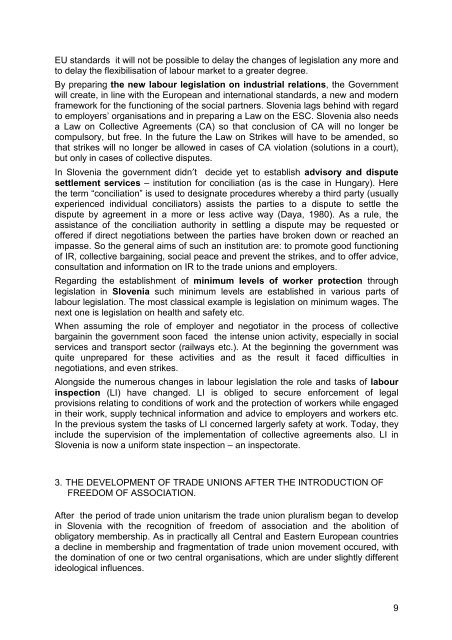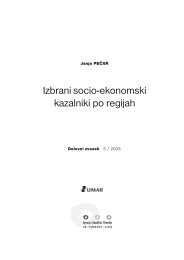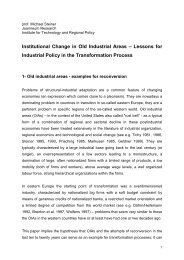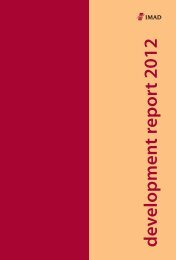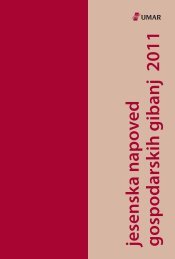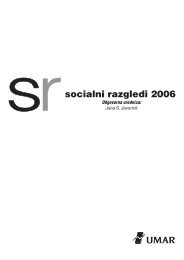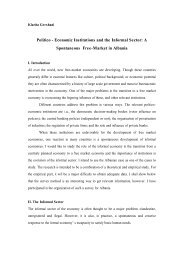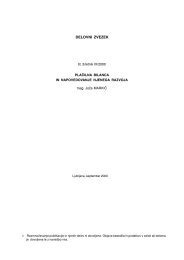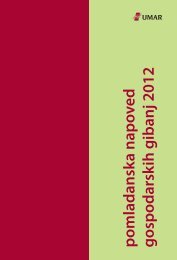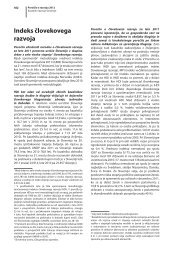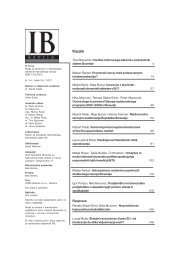The Development of New Industrial Relations in Slovenia - UMAR
The Development of New Industrial Relations in Slovenia - UMAR
The Development of New Industrial Relations in Slovenia - UMAR
You also want an ePaper? Increase the reach of your titles
YUMPU automatically turns print PDFs into web optimized ePapers that Google loves.
EU standards it will not be possible to delay the changes <strong>of</strong> legislation any more and<br />
to delay the flexibilisation <strong>of</strong> labour market to a greater degree.<br />
By prepar<strong>in</strong>g the new labour legislation on <strong>in</strong>dustrial relations, the Government<br />
will create, <strong>in</strong> l<strong>in</strong>e with the European and <strong>in</strong>ternational standards, a new and modern<br />
framework for the function<strong>in</strong>g <strong>of</strong> the social partners. <strong>Slovenia</strong> lags beh<strong>in</strong>d with regard<br />
to employers’ organisations and <strong>in</strong> prepar<strong>in</strong>g a Law on the ESC. <strong>Slovenia</strong> also needs<br />
a Law on Collective Agreements (CA) so that conclusion <strong>of</strong> CA will no longer be<br />
compulsory, but free. In the future the Law on Strikes will have to be amended, so<br />
that strikes will no longer be allowed <strong>in</strong> cases <strong>of</strong> CA violation (solutions <strong>in</strong> a court),<br />
but only <strong>in</strong> cases <strong>of</strong> collective disputes.<br />
In <strong>Slovenia</strong> the government didn′t decide yet to establish advisory and dispute<br />
settlement services – <strong>in</strong>stitution for conciliation (as is the case <strong>in</strong> Hungary). Here<br />
the term “conciliation” is used to designate procedures whereby a third party (usually<br />
experienced <strong>in</strong>dividual conciliators) assists the parties to a dispute to settle the<br />
dispute by agreement <strong>in</strong> a more or less active way (Daya, 1980). As a rule, the<br />
assistance <strong>of</strong> the conciliation authority <strong>in</strong> settl<strong>in</strong>g a dispute may be requested or<br />
<strong>of</strong>fered if direct negotiations between the parties have broken down or reached an<br />
impasse. So the general aims <strong>of</strong> such an <strong>in</strong>stitution are: to promote good function<strong>in</strong>g<br />
<strong>of</strong> IR, collective barga<strong>in</strong><strong>in</strong>g, social peace and prevent the strikes, and to <strong>of</strong>fer advice,<br />
consultation and <strong>in</strong>formation on IR to the trade unions and employers.<br />
Regard<strong>in</strong>g the establishment <strong>of</strong> m<strong>in</strong>imum levels <strong>of</strong> worker protection through<br />
legislation <strong>in</strong> <strong>Slovenia</strong> such m<strong>in</strong>imum levels are established <strong>in</strong> various parts <strong>of</strong><br />
labour legislation. <strong>The</strong> most classical example is legislation on m<strong>in</strong>imum wages. <strong>The</strong><br />
next one is legislation on health and safety etc.<br />
When assum<strong>in</strong>g the role <strong>of</strong> employer and negotiator <strong>in</strong> the process <strong>of</strong> collective<br />
barga<strong>in</strong><strong>in</strong> the government soon faced the <strong>in</strong>tense union activity, especially <strong>in</strong> social<br />
services and transport sector (railways etc.). At the beg<strong>in</strong>n<strong>in</strong>g the government was<br />
quite unprepared for these activities and as the result it faced difficulties <strong>in</strong><br />
negotiations, and even strikes.<br />
Alongside the numerous changes <strong>in</strong> labour legislation the role and tasks <strong>of</strong> labour<br />
<strong>in</strong>spection (LI) have changed. LI is obliged to secure enforcement <strong>of</strong> legal<br />
provisions relat<strong>in</strong>g to conditions <strong>of</strong> work and the protection <strong>of</strong> workers while engaged<br />
<strong>in</strong> their work, supply technical <strong>in</strong>formation and advice to employers and workers etc.<br />
In the previous system the tasks <strong>of</strong> LI concerned largerly safety at work. Today, they<br />
<strong>in</strong>clude the supervision <strong>of</strong> the implementation <strong>of</strong> collective agreements also. LI <strong>in</strong><br />
<strong>Slovenia</strong> is now a uniform state <strong>in</strong>spection – an <strong>in</strong>spectorate.<br />
3. THE DEVELOPMENT OF TRADE UNIONS AFTER THE INTRODUCTION OF<br />
FREEDOM OF ASSOCIATION.<br />
After the period <strong>of</strong> trade union unitarism the trade union pluralism began to develop<br />
<strong>in</strong> <strong>Slovenia</strong> with the recognition <strong>of</strong> freedom <strong>of</strong> association and the abolition <strong>of</strong><br />
obligatory membership. As <strong>in</strong> practically all Central and Eastern European countries<br />
a decl<strong>in</strong>e <strong>in</strong> membership and fragmentation <strong>of</strong> trade union movement occured, with<br />
the dom<strong>in</strong>ation <strong>of</strong> one or two central organisations, which are under slightly different<br />
ideological <strong>in</strong>fluences.<br />
9


